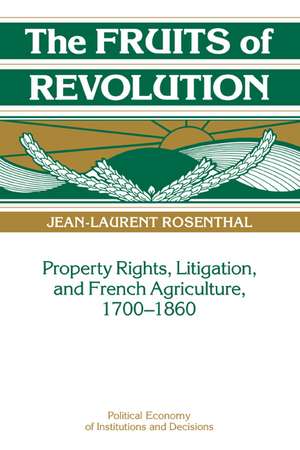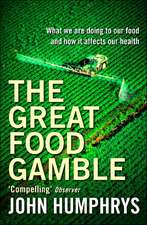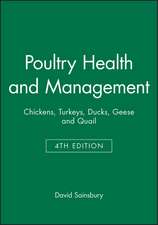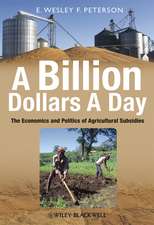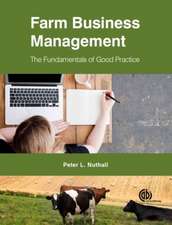The Fruits of Revolution: Property Rights, Litigation and French Agriculture, 1700–1860: Political Economy of Institutions and Decisions
Autor Jean-Laurent Rosenthalen Limba Engleză Hardback – 27 feb 1992
| Toate formatele și edițiile | Preț | Express |
|---|---|---|
| Paperback (1) | 283.41 lei 6-8 săpt. | |
| Cambridge University Press – 18 mar 2009 | 283.41 lei 6-8 săpt. | |
| Hardback (1) | 716.89 lei 6-8 săpt. | |
| Cambridge University Press – 27 feb 1992 | 716.89 lei 6-8 săpt. |
Din seria Political Economy of Institutions and Decisions
-
 Preț: 208.93 lei
Preț: 208.93 lei -
 Preț: 200.85 lei
Preț: 200.85 lei -
 Preț: 235.99 lei
Preț: 235.99 lei -
 Preț: 306.68 lei
Preț: 306.68 lei -
 Preț: 133.60 lei
Preț: 133.60 lei -
 Preț: 211.84 lei
Preț: 211.84 lei -
 Preț: 231.82 lei
Preț: 231.82 lei -
 Preț: 295.55 lei
Preț: 295.55 lei -
 Preț: 236.43 lei
Preț: 236.43 lei -
 Preț: 281.49 lei
Preț: 281.49 lei -
 Preț: 265.11 lei
Preț: 265.11 lei -
 Preț: 228.38 lei
Preț: 228.38 lei -
 Preț: 279.98 lei
Preț: 279.98 lei -
 Preț: 285.37 lei
Preț: 285.37 lei - 14%
 Preț: 773.75 lei
Preț: 773.75 lei -
 Preț: 233.38 lei
Preț: 233.38 lei -
 Preț: 247.41 lei
Preț: 247.41 lei -
 Preț: 203.12 lei
Preț: 203.12 lei -
 Preț: 230.33 lei
Preț: 230.33 lei -
 Preț: 286.69 lei
Preț: 286.69 lei - 14%
 Preț: 790.57 lei
Preț: 790.57 lei -
 Preț: 265.32 lei
Preț: 265.32 lei - 11%
 Preț: 554.15 lei
Preț: 554.15 lei -
 Preț: 287.07 lei
Preț: 287.07 lei - 11%
 Preț: 700.20 lei
Preț: 700.20 lei -
 Preț: 273.13 lei
Preț: 273.13 lei -
 Preț: 459.84 lei
Preț: 459.84 lei -
 Preț: 280.35 lei
Preț: 280.35 lei -
 Preț: 260.11 lei
Preț: 260.11 lei - 11%
 Preț: 640.30 lei
Preț: 640.30 lei -
 Preț: 286.89 lei
Preț: 286.89 lei - 11%
 Preț: 641.80 lei
Preț: 641.80 lei - 11%
 Preț: 635.32 lei
Preț: 635.32 lei -
 Preț: 247.80 lei
Preț: 247.80 lei - 11%
 Preț: 691.81 lei
Preț: 691.81 lei -
 Preț: 287.48 lei
Preț: 287.48 lei -
 Preț: 271.01 lei
Preț: 271.01 lei -
 Preț: 265.70 lei
Preț: 265.70 lei -
 Preț: 227.83 lei
Preț: 227.83 lei
Preț: 716.89 lei
Preț vechi: 833.60 lei
-14% Nou
Puncte Express: 1075
Preț estimativ în valută:
137.20€ • 141.54$ • 116.11£
137.20€ • 141.54$ • 116.11£
Carte tipărită la comandă
Livrare economică 05-19 martie
Preluare comenzi: 021 569.72.76
Specificații
ISBN-13: 9780521392204
ISBN-10: 0521392209
Pagini: 236
Dimensiuni: 157 x 235 x 20 mm
Greutate: 0.45 kg
Ediția:New.
Editura: Cambridge University Press
Colecția Cambridge University Press
Seria Political Economy of Institutions and Decisions
Locul publicării:New York, United States
ISBN-10: 0521392209
Pagini: 236
Dimensiuni: 157 x 235 x 20 mm
Greutate: 0.45 kg
Ediția:New.
Editura: Cambridge University Press
Colecția Cambridge University Press
Seria Political Economy of Institutions and Decisions
Locul publicării:New York, United States
Cuprins
List of tables, figures, and maps; Series editors' preface; Preface; 1. Introduction; Part I. History And Economics: 2. The French Revolution and French economic history; 3. Institutions and economic growth; Part II. Drainage and Irrigation: 4. A survey of water control projects; 5. Relative prices and the supply of water control; 6. Drainage in the Pays d'Auge, 1700–1848: the weight of uncertain property rights; 7. The development of irrigation in Provence, 1700–1860: the French Revolution and economic growth; Part III. Property Rights and Litigation under Absolutism: 8. The weaknesses of monopoly power; 9. Settlement, litigation, and the drainage of marshes in England and France, 1600–1840; 10. Conclusion; Appendices; Bibliography; Index.
Recenzii
"This book deserves a wide audience among scholars working at the intersection of economic, legal and political history." Reviews of Books
"Well documented, and fully informed with state-of-the-art economic analysis, this book provides an example of the very best that modern economic history has to offer." The Annalas of the American Academy
"It is Rosenthal's contention that it was the institutional improvements realized by the Revolution that in time permitted full access to technological change. From this point of view the events of 1789 brought France into the modern world. Nineteenth-century scholars will find this volume worthwhile reading for the information it provides about the economic history of the period." Leonore Loft, Nineteenth-Century French Studies
"Well documented, and fully informed with state-of-the-art economic analysis, this book provides an example of the very best that modern economic history has to offer." The Annalas of the American Academy
"It is Rosenthal's contention that it was the institutional improvements realized by the Revolution that in time permitted full access to technological change. From this point of view the events of 1789 brought France into the modern world. Nineteenth-century scholars will find this volume worthwhile reading for the information it provides about the economic history of the period." Leonore Loft, Nineteenth-Century French Studies
Descriere
The Fruits of Revolution examines the impact of revolution on French agricultural development.
